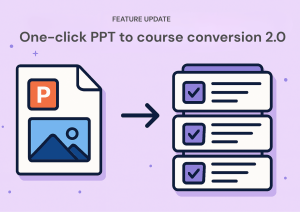
Why is Educational Technology Important for Modern Learning
- Author: Urban Rotar
- Published:

How does educational technology increase student engagement?
Educational technology boosts engagement by providing interactive and immersive learning experiences. Digital tools, such as virtual simulations and educational games, make learning enjoyable and cater to various learning styles.
Can educational technology support personalized learning?
Yes, educational technology offers tailored instruction and feedback, allowing students to learn at their own pace. It addresses individual needs, ensuring effective and personalized education.
How does educational technology prepare students for the modern workplace?
Educational technology develops essential skills like critical thinking, problem-solving, and digital literacy. It provides practical, real-world applications, ensuring students are ready for the demands of today’s workforce.
Key Takeaways - Why is Educational Technology Important:
- Educational technology boosts student engagement through interactive and immersive experiences.
- Personalized learning with technology caters to individual learning styles and needs.
- Digital tools prepare students for the modern workforce by developing essential skills.
- Educational technology promotes equity and inclusion by addressing the digital divide.
- Technology integration in education transforms teaching and learning for a tech-savvy world.
Educational technology has become an important cornerstone in contemporary education, reshaping the way teachers teach and students learn. The integration of educational technologies in modern learning environments has proven to be transformative, enhancing student engagement and personalized learning while preparing students for the demands of the modern workplace. In this article, we will explore why educational technology is important and its multifaceted benefits for modern learning.
Imagine trying to teach algebra to a room full of teenagers without a single gadget—sounds like a scene from a horror movie, right? In today’s digital age, using chalk and a blackboard just doesn’t cut it. So, why is educational technology important? Simply put, it transforms the learning experience by engaging students, personalizing education, and preparing them for a tech-savvy world. With digital tools in the classroom, education becomes interactive, inclusive, and tailored to each student’s needs.
Enhancing Student Engagement
Educational technology can significantly increase student engagement by providing interactive and immersive learning experiences. It also fosters critical thinking skills among students by encouraging them to solve problems and think analytically through the use of digital tools. Imagine a classroom where lessons are not just taught but experienced. Digital learning tools cater to different learning styles, making learning more enjoyable and effective for every student. Whether through interactive simulations or virtual reality, technology in the classroom can help teachers engage students and promote active learning.
Incorporating technology into lessons helps students stay focused and motivated. Real-time feedback and assessment enable teachers to adjust their instruction dynamically. For instance, a math app that provides instant feedback can help students understand mistakes immediately, fostering a more effective learning process. Educational technology thus creates a dynamic learning environment where students are actively involved in their educational journey.

Personalized Learning Opportunities
Educational technology offers personalized learning opportunities, allowing students to learn at their own pace. Digital tools can provide tailored instruction and feedback, addressing individual learning needs effectively. This personalized approach ensures that no student is left behind.
Technology enables students to access educational resources and materials from anywhere, at any time. Online learning platforms facilitate collaboration and communication between students and teachers, breaking down geographical barriers. Additionally, educational technology helps teachers identify knowledge gaps, providing targeted support to enhance student learning. For example, adaptive learning software can analyze a student’s performance and adjust the difficulty of tasks accordingly, ensuring optimal learning conditions.
Effective Ways to Engage Students
Interactive content and activities can significantly boost student engagement and motivation. Educational technology provides opportunities for hands-on learning and experimentation, which are crucial for understanding complex concepts. For instance, virtual labs allow students to conduct experiments safely and affordably.
Digital tools facilitate project-based learning and collaboration, encouraging students to work together and learn from each other. Technology also enables students to create and share their own content, promoting creativity and self-expression. Access to virtual field trips and guest speakers broadens students’ perspectives, making learning more enriching and comprehensive.
Preparing Students for the Modern Workplace
Educational technology prepares students for the modern workforce by developing essential life skills. An education program that equips educators with the skills to incorporate technology into the classroom is crucial for this transformation. Digital tools provide training in critical thinking, problem-solving, and collaboration—skills highly valued in today’s job market. Access to online resources and educational materials fosters lifelong learning habits, essential in a rapidly evolving world.
Technology helps students develop digital literacy and fluency, crucial for navigating the modern workplace. Online learning platforms offer opportunities for students to practice and apply their skills in real-world contexts, bridging the gap between academic knowledge and practical application. For example, coding programs can teach students not just the syntax of a programming language but also how to think logically and solve problems efficiently.

The Future of Education: The Importance of Educational Technology
Educational technology is transforming the way we learn and teach, offering new opportunities for student engagement and success. As technology integration becomes more prevalent, teachers can provide personalized instruction and feedback more effectively. Online education expands access to educational resources and opportunities, promoting equity and inclusion.
Educational technology enables students to take ownership of their learning, fostering autonomy and self-directed learning. The future of education will be shaped by the effective use of educational technology, ensuring students are well-prepared for an increasingly complex and interconnected world.
Supporting Teacher Professional Development
Educational technology also supports teacher professional development, offering growth and learning opportunities. Digital tools allow teachers to access online resources and educational materials, promoting ongoing learning and development. Collaboration and communication between teachers are enhanced, fostering peer support and mentoring.
Educational technology provides opportunities for teachers to develop new skills and competencies, improving their practice. Online learning platforms offer access to professional development opportunities, aiding career advancement. For instance, online courses and webinars can help teachers stay updated with the latest educational trends and strategies, ensuring they can provide the best possible education to their students.
Addressing the Digital Divide
Educational technology can help address the digital divide, promoting equity and inclusion in education. Digital tools provide access to educational resources and opportunities regardless of geographical location or socio-economic status. Technology enables students to access online learning platforms and educational materials, ensuring equal access to education.
Educational technology helps bridge the gap between different learning styles and abilities, fostering inclusive education. Online education offers opportunities for students to access resources and materials, irrespective of their background or circumstances. For example, rural students can access the same quality of education as their urban counterparts through online classes and resources.

Measuring the Effectiveness of Educational Technology
The effectiveness of educational technology can be measured by its impact on student learning outcomes. Digital tools provide data and analytics, enabling teachers to assess student progress and adjust their instruction accordingly. This data-driven approach promotes evidence-based practice in education.
Technology facilitates the collection and analysis of data, helping to evaluate its effectiveness in promoting student engagement and motivation. Online learning platforms offer opportunities for teachers to assess student learning and make necessary adjustments, ensuring that the educational process remains dynamic and effective.
So why is educational technology important?
Educational technology is of essential importance for modern learning, offering opportunities for student engagement, personalized learning, and preparation for the modern workforce. Technology integration is critical in education, enabling teachers to provide effective instruction and feedback. Online education expands access to resources and opportunities, promoting equity and inclusion. Educational technology empowers students to take control of their learning, fostering autonomy and self-directed learning. Ultimately, the effective use of educational technology is crucial for student success in an increasingly complex and interconnected world.



